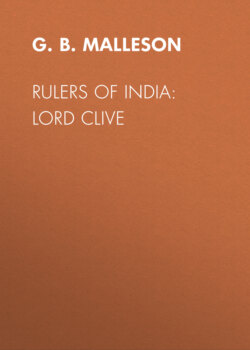Читать книгу Rulers of India: Lord Clive - G. B. Malleson - Страница 3
На сайте Литреса книга снята с продажи.
PREFACE
ОглавлениеTable of Contents
The following list represents the works of the last century which I have consulted to write this Life of Lord Clive:
Orme's History of Indostan (original edition); The Siyaru-l Muta-akherin of Ghulám Husain Khán (Review of Modern Times), translated copy; Cambridge's War in India (containing the Journal of Stringer Lawrence); The Memoir of Dupleix (in French); Grose's Voyage to the East Indies; Ive's Voyage and Historical Narrative; Transactions in India from the commencement of the French War in 1756 (published in 1786); Caraccioli's Life of Lord Clive; Vansittart's Narrative of the Transactions in Bengal; Ironside's Narrative of the Military Transactions in Bengal in 1760-1; Verelst's English Government in Bengal; some numbers of the Asiatic Annual Register; Kindersley's Letters; and Scrafton's Letters; and, for the earlier period—that displaying the period immediately preceding and following the dawn of genius—the recently written extracts from the Madras records by Mr. G. W. Forrest.
Of works of scarcely less value published during the present century, I have consulted the admirable volumes by Colonel Mark Wilks, which bring the History of Southern India down to the storming of Seringapatam in 1799; The Journal of Captain Dalton, one of the heroes of Trichinopoli, written at the period of Clive's early victories, but only given to the world, with a memoir of his career, in 1886; Lord Stanhope's History of England; Malcolm's Life of Clive; and above all, that mine of wealth to a searcher into the details of Clive's services in Bengal, Colonel Broome's History of the Bengal Army. Colonel Broome was my intimate and valued friend. He knew more about the history of the rise of the English in India than any man I ever met. He had made the subject a life-study. He had read every tract, however old, every letter, however difficult to decipher, every record of the period up to and beyond the time of Job Charnock, and he was a past-master of his subject. He had collected an enormous mass of materials, the more bulky of which were dispersed at his untimely death. But I have seen and handled them, and I can state most positively, from my own knowledge, that every item of importance culled from them is contained in the admirable volume to which I have referred, and which was published in 1850. There is, alas, only that volume. Colonel Broome had set apart a vast mass of materials for his second, and had resolved to complete the work at Simla, to which place he was proceeding for the summer of, I think, 1870. But, in the course of transit, the box containing the materials was mysteriously spirited away, and I have not heard that it was ever found. From the nature of the documents collected I cannot but regard the loss as irreparable.
G. B. MALLESON.
NOTE
The orthography of proper names follows the system adopted by the Indian Government for the Imperial Gazetteer of India. That system, while adhering to the popular spelling of very well-known places, such as Punjab, Poona, Deccan, &c., employs in all other cases the vowels with the following uniform sounds:—
a, as in woman: á, as in father: i, as in kin: í, as in intrigue: o, as in cold: u, as in bull: ú, as in rural.
